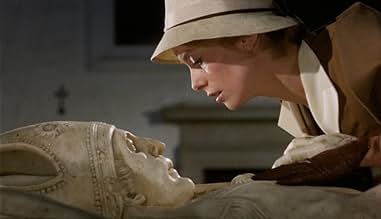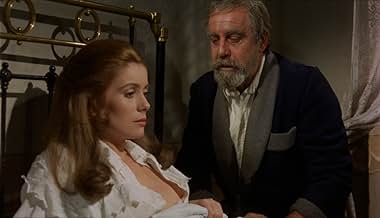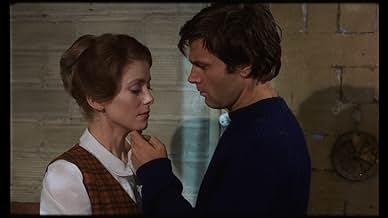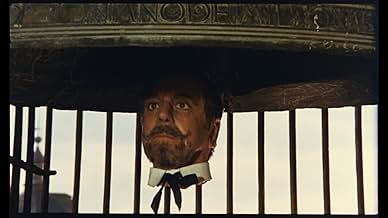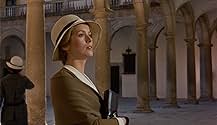IMDb रेटिंग
7.4/10
13 हज़ार
आपकी रेटिंग
अपनी मां की मृत्यु के तुरंत बाद, एक मासूम और युवा महिला को अपने मध्यम आयु वर्ग के कुलीन अभिभावक के घर में शरण मिलेगी.अपनी मां की मृत्यु के तुरंत बाद, एक मासूम और युवा महिला को अपने मध्यम आयु वर्ग के कुलीन अभिभावक के घर में शरण मिलेगी.अपनी मां की मृत्यु के तुरंत बाद, एक मासूम और युवा महिला को अपने मध्यम आयु वर्ग के कुलीन अभिभावक के घर में शरण मिलेगी.
- निर्देशक
- लेखक
- स्टार
- 1 ऑस्कर के लिए नामांकित
- 11 जीत और कुल 4 नामांकन
Mary Paz Pondal
- Muchacha
- (as María Paz Pondal)
Juanjo Menéndez
- Don Cándido
- (as Juan José Menéndez)
फ़ीचर्ड समीक्षाएं
It might appear to the uninitiated that Luis Bunuel is making with Tristana at first a good but very predictable melodrama that turns somewhere in the second half mark into a strange power-play of desire turned on its head. But in reality, when looking at it after seeing a couple of his films, Bunuel's work with Tristana is somehow kind of touching. He cares about all of his characters- none of whom what they seem or dumbed down to Lifetime movie levels- and in this stuck-in-its-ways society there are boundaries that are crossed in tragic means. Usually one might expect some dark or subtle comedy of manners or satire on society, but here it's stripped away, as it was for some of Viridiana, and all that's left is a spare, tense and expertly manipulated tale where the tables are turned once or twice on the couple of Don Lope (Fernando Rey) and Tristana (Catherine Deneauve, maybe her most physically demanding of her two Bunuel roles).
One thing that's extraordinary about how Bunuel directs and allows for his actors to play the scenes is that the emotions are only heightened to a certain level, and never with the aid of things like music or tears. It is what it is: Don Lope has taken care of Tristana as her guardian since her mother died, and now has inserted himself as her father/husband figure, with his servant Saturna (stern-faced but understanding Lola Gaos) a kind of unofficial confessional. Tristana wants some freedom, just to go out and walk around, and feels caught by Don Lope even when not doing anything... until she meets Franco Nero's Don Horacio, a painter who could promise a new life. This goes without saying that one should take it for granted that Tristana isn't *that* young and could take care of herself without Lope, but maybe this is part of the point of the slight absurdity- and eventual tragedy- of this struggle.
Two years go by after she leaves Lope for Horacio, with a tumor in her leg. She's now a cripple, and now once again a kind of mental prisoner in Lope's home; the complexity of old man Lope as being duplicitous is seen right after he finds out she's sick and Horacio asks for Lope to help keep her home, and he nearly skips home saying "she'll never leave again!" All of this, leading up to a final twist that is very satisfying if extending the tragic dimension of Lope and Tristana, would be soapy and tawdry and, possibly, very standard in other hands. For Bunuel, there's a lot of personal ground here; I wonder at times if Rey is a little like one of those actors a director of Bunuel's auteur-stature uses as a means of expressing himself through an actor, or if it's just because he's so good at playing wicked AND sympathetic bourgeois. And the mixture of ideas, if not really themes, covering what's love and over-control, religion, deformity, a free will are potent and exciting even in such subtle and (as Maltin said) serenely filmed territory.
It's also a minor triumph for Deneuve, who between this and Belle de jour did some of her best work as an actress for the notorious surrealist. Her character's continual dream of Lope's beheaded top dangling from a church tower is the closest we see to a classic surrealist scene, though it's reminiscent of Los Olvidados as brilliantly expressing one character's mind-set. Deneuve is up for the challenge of putting up a tough interior and exterior presence; she gets paler towards the end (if this was for real or just a bad print I couldn't tell), and there's a lot of pain in her eyes and expression throughout. It's great work for one of the director's most subtly demanding works- beneath its conventional framework of a love-triangle story is sorrow and horror at the human condition.
One thing that's extraordinary about how Bunuel directs and allows for his actors to play the scenes is that the emotions are only heightened to a certain level, and never with the aid of things like music or tears. It is what it is: Don Lope has taken care of Tristana as her guardian since her mother died, and now has inserted himself as her father/husband figure, with his servant Saturna (stern-faced but understanding Lola Gaos) a kind of unofficial confessional. Tristana wants some freedom, just to go out and walk around, and feels caught by Don Lope even when not doing anything... until she meets Franco Nero's Don Horacio, a painter who could promise a new life. This goes without saying that one should take it for granted that Tristana isn't *that* young and could take care of herself without Lope, but maybe this is part of the point of the slight absurdity- and eventual tragedy- of this struggle.
Two years go by after she leaves Lope for Horacio, with a tumor in her leg. She's now a cripple, and now once again a kind of mental prisoner in Lope's home; the complexity of old man Lope as being duplicitous is seen right after he finds out she's sick and Horacio asks for Lope to help keep her home, and he nearly skips home saying "she'll never leave again!" All of this, leading up to a final twist that is very satisfying if extending the tragic dimension of Lope and Tristana, would be soapy and tawdry and, possibly, very standard in other hands. For Bunuel, there's a lot of personal ground here; I wonder at times if Rey is a little like one of those actors a director of Bunuel's auteur-stature uses as a means of expressing himself through an actor, or if it's just because he's so good at playing wicked AND sympathetic bourgeois. And the mixture of ideas, if not really themes, covering what's love and over-control, religion, deformity, a free will are potent and exciting even in such subtle and (as Maltin said) serenely filmed territory.
It's also a minor triumph for Deneuve, who between this and Belle de jour did some of her best work as an actress for the notorious surrealist. Her character's continual dream of Lope's beheaded top dangling from a church tower is the closest we see to a classic surrealist scene, though it's reminiscent of Los Olvidados as brilliantly expressing one character's mind-set. Deneuve is up for the challenge of putting up a tough interior and exterior presence; she gets paler towards the end (if this was for real or just a bad print I couldn't tell), and there's a lot of pain in her eyes and expression throughout. It's great work for one of the director's most subtly demanding works- beneath its conventional framework of a love-triangle story is sorrow and horror at the human condition.
One of the better melodramas by Bunuel that stars Catherine Deneuve --Belle De Jour was the most successful. Tristana is the third installment to Bunuel's ill-fated heroine yarn: as we know, Viridiana and Belle De Jour were the first 2. Nevertheless, the film's not as surreal as these previous two films; however, Bunuel still maintains his use of dream sequences and familiar motifs. Rey is excellent as the lecherous uncle, and Deneuve is also good as the title character. Bunuel has definitely excelled in focusing on the aesthetic approach to a story-line; however, this respect can be overwhelming for some viewers, especially those who are more comfortable with the fast-paced American movies. In short, Tristana is still an excellent movie regardless of these unusual aspects.
A cinematic masterpiece, Bunuel's Tristana works on many layers, and can be enjoyed at face-value, as a dark romance, or as a scathing social criticism of pre/post World War II Spain. The latter interpretation is rather difficult to digest with just one viewing, but its allegories of Tristana and Don Lope as fascism and socialism present a richly disguised history of the Spanish Civil War and Spain's constant struggle between the socialist and the fascist. As is typical of Bunuel's work, his characteristic criticism of the Church as well as bourgeoisie lifestyles also presents itself in Tristana, however not as markedly as in such features as L'Age D'Or or The Discreet Charm.
When the young woman Tristana (Catherine Deneuve)'s mother dies, she is entrusted to the guardianship of the well-respected though old Don Lope (Fernando Rey) being served by the old maid (Lola Gaos) . There she is besieged as emotionally as sexually to be his lover . Don Lope is more than 60 years, single, liberal and anticlerical and natural inclination to idleness and indolence . Then Tristana meets the painter Horacio (Franco Nero) , they fall in love with each other and Tristana flees from Don Lope who faces competition from her suitor .
This is the sensuous story of Tristana , a drama with surrealism and sour portrait upon social classes , catholicism , sexual abuses and many other things , being stunningly realized by the Spanish maestro of surrealism , the great Luis Buñuel . This is a typical Buñuel film , as there are a lot of symbolism , social critique , including mockery or wholesale review upon religion , especially Catholicism . Luis Buñuel was given a strict Jesuit education which sowed the seeds of his obsession with both subversive behavior and religion , issues well shown in a lot of films and that would preoccupy Buñuel for the rest of his career . Here Bunuel gives a perverse studio about religion , old age , desire along with deformity ; and was strongly cut by Spanish censorship . The film describes unequal status of women , heir to a long tradition of marginalization, subjugation, exploitation and lack of rights , subsequently suffragists and protest movements emerge in pro-women . Interesting and thought-provoking screenplay from the same Luis Buñuel and Julio Alejandro , Buñuel's usual screenwriter , based on the novel by Benito Pérez Galdós ; they pull off a straight-faced treatment of shocking subject matter . Bunuel's adaptation retains the spirit of protest written by Galdos, and moved to a later time in 40 years to the novel . Nice acting by Fernando Rey as an old man who falls for the innocent girl in his charge , to the point of result to be perhaps the best performance of his long career . Rey played various Buñuel films such as The Discreet Charm of the Bourgeoisie , That Obscure object of Desire and Viridiana . And Catherine Deneuve's finest most enigmatic acting as a young cynical woman who goes to live with her guardian and subsequently turned into a bitter incapacitated cripple . The film relies heavily on the relationship between them , as is developed a rare lover/father relationship with her . One of Bunuel's most serious and serene ¨Tristana¨ is packed with surreal moments , criticism , absurd situations , masochism and nightmares . Furthermore , Buñuel satirizes and he carries out outright critical to aristocracy , bourgeoisie and attack upon religion . Pretty good support cast gives fine acting ; it is mostly formed by nice Spanish actors such as Antonio Casas , Fernando Cebrian, Jose Maria Caffarel , Antonio Ferrandis , Jose Calvo , Sergio Mendizabal , Juanjo Menendez ,among others . Beautifully shot in Toledo with a splendid cinematography by Jose Aguayo . Tristana was voted tenth best Spanish film by professionals and critics in 1996 Spanish cinema centenary and nominated for an Oscar ,film Foreign Language.
Thid wry and dramatic motion picture was compellingly directed by Luis Buñuel who was voted the 14th Greatest Director of all time . This Buñuel's strange film belongs to his French second period ; in fact , it's plenty of known Spanish actors . Born in Calanda , Aragon (1900) , Buñuel subsequently moved to Madrid to study at the university there, where his close friends included Salvador Dalí and Federico García Lorca. After moving to Paris , at the beginning Buñuel did a variety of film-related odd jobs , including working as an assistant to director Jean Epstein . With financial help from his mother and creative assistance from Dalí, he made his first film , this 17-minute "Un Chien Andalou" (1929), and immediately catapulted himself into film history thanks to its disturbing images and surrealist plot . The following year , sponsored by wealthy art patrons, he made his first picture , the scabrous witty and violent "Age of Gold" (1930), which mercilessly attacked the church and the middle classes, themes that would preoccupy Buñuel for the rest of his career . That career, though, seemed almost over by the mid-1930s, as he found work increasingly hard to come by and after the Spanish Civil War , where he made ¨Las Hurdes¨ , as Luis emigrated to the US where he worked for the Museum of Modern Art and as a film dubber for Warner Bros . He subsequently went on his Mexican period he teamed up with producer Óscar Dancigers and after a couple of unmemorable efforts shot back to international attention with the lacerating study of Mexican street urchins in ¨Los Olvidados¨ (1950), winning him the Best Director award at the Cannes Film Festival. But despite this new-found acclaim, Buñuel spent much of the next decade working on a variety of ultra-low-budget films, few of which made much impact outside Spanish-speaking countries , though many of them are well worth seeking out . As he went on filming "The Great Madcap" , ¨The brute¨, "Wuthering Heights", ¨El¨ , "The Criminal Life of Archibaldo De la Cruz" , ¨Robinson Crusoe¨ , ¨Death in the garden¨ and many others . After returning his native country, Spain, by making ¨Viridiana¨ this film was prohibited on the grounds of blasphemy as well as ¨The milky way¨ or Via Lactea , both of them were strongly prohibited by Spanish censorship . This French-Spanish final period in collaboration with producer Serge Silberman and writer Jean-Claude Carrière with notorious as well as polemic films such as ¨Viridiana¨ , ¨The Discreet Charm of the Bourgeoisie" and ¨Belle De Jour¨. His last one was the notorious ¨That obscure object of desire¨ (1977) .
This is the sensuous story of Tristana , a drama with surrealism and sour portrait upon social classes , catholicism , sexual abuses and many other things , being stunningly realized by the Spanish maestro of surrealism , the great Luis Buñuel . This is a typical Buñuel film , as there are a lot of symbolism , social critique , including mockery or wholesale review upon religion , especially Catholicism . Luis Buñuel was given a strict Jesuit education which sowed the seeds of his obsession with both subversive behavior and religion , issues well shown in a lot of films and that would preoccupy Buñuel for the rest of his career . Here Bunuel gives a perverse studio about religion , old age , desire along with deformity ; and was strongly cut by Spanish censorship . The film describes unequal status of women , heir to a long tradition of marginalization, subjugation, exploitation and lack of rights , subsequently suffragists and protest movements emerge in pro-women . Interesting and thought-provoking screenplay from the same Luis Buñuel and Julio Alejandro , Buñuel's usual screenwriter , based on the novel by Benito Pérez Galdós ; they pull off a straight-faced treatment of shocking subject matter . Bunuel's adaptation retains the spirit of protest written by Galdos, and moved to a later time in 40 years to the novel . Nice acting by Fernando Rey as an old man who falls for the innocent girl in his charge , to the point of result to be perhaps the best performance of his long career . Rey played various Buñuel films such as The Discreet Charm of the Bourgeoisie , That Obscure object of Desire and Viridiana . And Catherine Deneuve's finest most enigmatic acting as a young cynical woman who goes to live with her guardian and subsequently turned into a bitter incapacitated cripple . The film relies heavily on the relationship between them , as is developed a rare lover/father relationship with her . One of Bunuel's most serious and serene ¨Tristana¨ is packed with surreal moments , criticism , absurd situations , masochism and nightmares . Furthermore , Buñuel satirizes and he carries out outright critical to aristocracy , bourgeoisie and attack upon religion . Pretty good support cast gives fine acting ; it is mostly formed by nice Spanish actors such as Antonio Casas , Fernando Cebrian, Jose Maria Caffarel , Antonio Ferrandis , Jose Calvo , Sergio Mendizabal , Juanjo Menendez ,among others . Beautifully shot in Toledo with a splendid cinematography by Jose Aguayo . Tristana was voted tenth best Spanish film by professionals and critics in 1996 Spanish cinema centenary and nominated for an Oscar ,film Foreign Language.
Thid wry and dramatic motion picture was compellingly directed by Luis Buñuel who was voted the 14th Greatest Director of all time . This Buñuel's strange film belongs to his French second period ; in fact , it's plenty of known Spanish actors . Born in Calanda , Aragon (1900) , Buñuel subsequently moved to Madrid to study at the university there, where his close friends included Salvador Dalí and Federico García Lorca. After moving to Paris , at the beginning Buñuel did a variety of film-related odd jobs , including working as an assistant to director Jean Epstein . With financial help from his mother and creative assistance from Dalí, he made his first film , this 17-minute "Un Chien Andalou" (1929), and immediately catapulted himself into film history thanks to its disturbing images and surrealist plot . The following year , sponsored by wealthy art patrons, he made his first picture , the scabrous witty and violent "Age of Gold" (1930), which mercilessly attacked the church and the middle classes, themes that would preoccupy Buñuel for the rest of his career . That career, though, seemed almost over by the mid-1930s, as he found work increasingly hard to come by and after the Spanish Civil War , where he made ¨Las Hurdes¨ , as Luis emigrated to the US where he worked for the Museum of Modern Art and as a film dubber for Warner Bros . He subsequently went on his Mexican period he teamed up with producer Óscar Dancigers and after a couple of unmemorable efforts shot back to international attention with the lacerating study of Mexican street urchins in ¨Los Olvidados¨ (1950), winning him the Best Director award at the Cannes Film Festival. But despite this new-found acclaim, Buñuel spent much of the next decade working on a variety of ultra-low-budget films, few of which made much impact outside Spanish-speaking countries , though many of them are well worth seeking out . As he went on filming "The Great Madcap" , ¨The brute¨, "Wuthering Heights", ¨El¨ , "The Criminal Life of Archibaldo De la Cruz" , ¨Robinson Crusoe¨ , ¨Death in the garden¨ and many others . After returning his native country, Spain, by making ¨Viridiana¨ this film was prohibited on the grounds of blasphemy as well as ¨The milky way¨ or Via Lactea , both of them were strongly prohibited by Spanish censorship . This French-Spanish final period in collaboration with producer Serge Silberman and writer Jean-Claude Carrière with notorious as well as polemic films such as ¨Viridiana¨ , ¨The Discreet Charm of the Bourgeoisie" and ¨Belle De Jour¨. His last one was the notorious ¨That obscure object of desire¨ (1977) .
Try this: 'Viridiana' meets 'Cet obscure objet du désir', but it is one of the least shocking, least surreal and least fascinating films by Buñuel. There are some brief illusional sequences and Deneuve is said to be the most expensive part of this film, but her performance doesn't reflect it. It is simply not convincing enough. Nevertheless it is a recognizable Buñuel concept in a subtle and accessible film. Cinematographer Jose F. Aguayo (Viridiana) did a fine job (in color) that looks like a step in the direction of the cinematography of Buñuel's last three films. No music as always for maximum sobriety. I don't especially want to recommend this, though I would like to see it again some day myself. If only to revive the great Fernando Rey (French Connection, Viridiana, The Immortal Story)...
7/10
7/10
क्या आपको पता है
- ट्रिवियाLuis Buñuel said that many of Tristana's idiosyncrasies, including her habit of asking people to choose between nearly identical objects, was based on the director's sister's similar habits.
- भाव
Don Lope: Poor workers. Cheated and then beaten. Work is a curse, Saturno. Down with work that you have to do to survive. That work isn't honorable, as some say. All it does is fatten the exploiting swine. However, what you do for pleasure ennobles man. If only we could all work like that. Look at me, I'd rather be hanged than work! So, I live poorly, but I live without working.
- इसके अलावा अन्य वर्जनOriginally released in Europe at 105 minutes.
- साउंडट्रैकÉtude No 12 in C minor, Op 10 'Revolutionary'
Written by Frédéric Chopin
टॉप पसंद
रेटिंग देने के लिए साइन-इन करें और वैयक्तिकृत सुझावों के लिए वॉचलिस्ट करें
- How long is Tristana?Alexa द्वारा संचालित
विवरण
- रिलीज़ की तारीख़
- कंट्री ऑफ़ ओरिजिन
- आधिकारिक साइट
- भाषा
- इस रूप में भी जाना जाता है
- Mảnh Đời Của Tristana
- फ़िल्माने की जगहें
- Paseo Recaredo, Toledo, Castilla-La Mancha, स्पेन(opening and closing scenes with Saturna, Viridiana and the mute boy)
- उत्पादन कंपनियां
- IMDbPro पर और कंपनी क्रेडिट देखें
बॉक्स ऑफ़िस
- US और कनाडा में सकल
- $14,586
- US और कनाडा में पहले सप्ताह में कुल कमाई
- $4,754
- 14 अक्टू॰ 2012
- दुनिया भर में सकल
- $14,586
- चलने की अवधि1 घंटा 39 मिनट
- ध्वनि मिश्रण
- पक्ष अनुपात
- 1.66 : 1
इस पेज में योगदान दें
किसी बदलाव का सुझाव दें या अनुपलब्ध कॉन्टेंट जोड़ें



